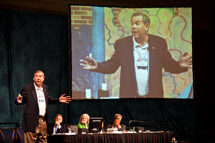
Money is not the business of the church – Jesus is
 BY LINDA WORTHINGTON
BY LINDA WORTHINGTON
UMCONNECTION STAFF
Bishop Schol introduced the Rev. Clif Christopher as the “guru of stewardship” when he spoke Wednesday evening in the first of two powerful presentations on giving to the church.
Christopher focused on why we give, using the rise and fall of General Motors (GM) as an illustration of the plight of the church today with its declining resources. It was the strongest car company in the world, then had to receive a bailout to try to come back from near death, he said. Which it did. “Religion used to receive 60 percent of charitable giving, now it only gets 30 percent.”
Christopher maintains that we’ve got to stop acting like GM, shrugging our shoulders and saying, ‘”They’ll buy from us because we’re GM,” or “they’ll give to us because we’re the church.” Today we have to compete.
The church must learn to be competitive, as GM did, an idea that goes against the grain for many people. “Why is your church the best place to give your (charitable) dollar?” Pastors and finance committees must be able to answer that question.
Christopher cited Lyle Schaller’s concept of charity. “The world is entirely different,” he quoted Schaller, “but most of us bring the stewardship of the 50s and 60s.” But competition for charitable dollars has increased tremendously.
We give for three reasons, Christopher said.
- A belief in the mission of the institution. For the church, that mission is that we want to change lives. But we don’t tell the stories of changed lives well.
- A regard for staff leadership. People don’t give for a building, but for the people who lead in the church, including the pastor. Leadership includes pastors knowing what donors in the church give. “No non-profit organization would believe their leader didn’t know the donor base,” he said.
- It’s fiscally responsible. No non-profit would air its dirty laundry in public, Christopher said. ”We don’t give to sinking ships,” but that’s what we ask for when we say we need money because we’re broke or in a deficit. He cautioned against putting financial reports in the bulletin or on the website. “It’s stupid,” he declared several times. “Who would say I’m going to find me a church that is broke? What people are really looking for is Jesus and they need to know there’s someone who can help heal their hurt and it’s someone who has done it before.”
Christopher made three points directed primarily at the clergy:
- Pastors must tithe and make it known to the congregation, in such a way that is clearly understood. “Preachers,” he said, “the sheep ain’t going where the shepherd ain’t leading.” It’s not enough to preach the virtues of tithing; he or she must be a living example.”
- Pastors must have high expectations of the membership in order to compete. Those expectations should be clear before someone becomes a member: tithing, attending worship on a regular basis, and being in service. After fulfilling these expectations, perhaps a person is ready for membership. “There is nothing about discipleship that Jesus calls a piece of cake,” Christopher said.
- Pastors need to know, not guess, the giving of their members, yet three-quarters of pastors do not know their members’ contributions. He dispelled the oft-stated notion that knowing would cause pastors to treat constituents unequally. Members are treated unequally all the time, according to their needs.
In addition, many pastors have personal rules about knowing their members’ giving, often voiced as a trust issue. But, Christopher said, “What a person chooses to give is the best indicator of their following Christ – it is a measurement of their soul.” And that is indeed a pastor’s business.
It’s a lie to say that what a person gives is “between them and God,” he said, and recounted the many people who do know, from tax accountants to bankers to secretaries. Making disciples is a healthy church, Christopher said, not balancing the budget.
When people give to church, churches should express thanks, Christopher said, as all non-profits do. Most are prone to ignoring this step. “Preachers,” he said, “write thank-you notes every week. You’ll be amazed at how responsive people are.”
“We’re not in the money business,” Christopher said, “we’re in the Jesus business, but money tells a lot about the state of the person’s soul.”
Christopher’s leadership at the conference was sponsored by the Mid-Atlantic United Methodist Foundation, Inc.

Login/Register to leave comment